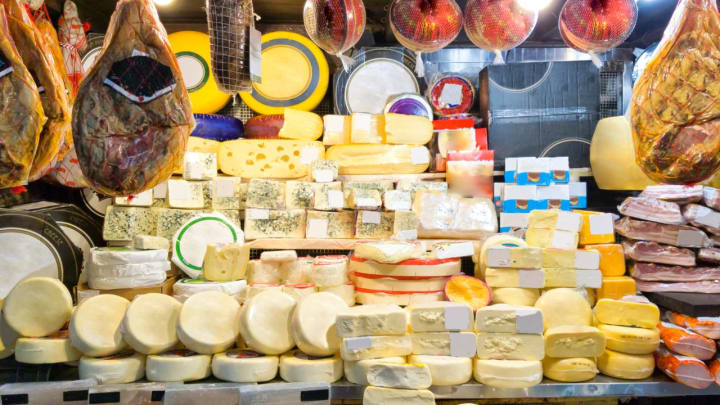90% Of The Cheese We Consume Has Pfizer GMO's Thanks To A Cheesy Loophole
Traditionally, milk, salt, starting culture, and animal rennet were the only four ingredients needed to make cheese.

Rennet is a clotting agent that separates the liquid from the solid portions of milk by curdling it into cheese. It is a necessary step in the production of cheese.
Today, the cheese-making industry uses four different types of rennet: microbial, vegetable, animal, and FPC (fermentation-produced chymosin), a genetically modified rennet that Pfizer developed.
Although Pfizer produces genetically modified rennet, cheese that contains Pfizer’s rennet is exempt from labeling requirements regarding the presence of genetically modified organisms due to a labeling loophole.
With the designation of Bioengineered FPC as Generally Regarded as Safe (GRAS), Pfizer was released from the pre-approval criteria that are in place for other novel food additives. This is true despite extensive safety concerns raised by studies.
Roughly 90% of cheese produced in North America is thought to include FPC rennet. Because ingredient labels do not differentiate between bioengineered and original animal-based products, customers are unable to determine what they are consuming.

Types Of Rennet:
1. Animal rennet: Traditionally used in cheesemaking, animal rennet is the oldest and most natural type of rennet. The lining of ruminant animals' stomachs naturally contains enzymes that coagulate milk.
Animal rennet is made up of a complex mixture of enzymes, as nature intended, as opposed to a single isolated enzyme obtained in a lab. This is why animal rennet makes the best tasting cheese, as well as the most widly tolerated cheeses for people with sensitivities.
2. Vegetable rennet: Although this substitute for animal rennet varies greatly depending on the source and is frequently mislabeled as such, it is a viable option if it's real.
The source of true vegetable rennet is plants that have coagulation enzymes. Since ancient times, these plant extracts have been utilized as coagulants for milk. Nettles, fig tree bark, and cardoon thistle are a few examples.
However, the final texture and flavor of cheese might be adversely affected by the use of vegetable rennet. This explains why the majority of cheese sold as "vegetable rennet" isn't actually made from vegetables. Since there is no regulation on the wording used for what kind of rennet is used in cheese labeling, it's either microbiological rennet (produced from mold) or FPC (the GMO form).
3. Microbial rennet: A different option to animal rennet is microbial rennet, in which a particular kind of mold, fungus, or yeast organism is cultivated and fermented in a laboratory environment (often fed soy) to produce the coagulating enzymes. Delicious. Therefore, even though the microbes aren't genetically changed, their food probably is. Cheeses labeled as "certified organic" or "certified vegetarian" frequently utizile this loophole option.
4. Genetically engineered FPC: By using genetic engineering techniques, scientists have created new, genetically modified species that produce these milk-curdling enzymes. FPC, the most widely used substitute for animal rennet in cheesemaking.
In actuality, these GMO-derived enzymes are used in 90% of the cheese produced in the United States.

FPC, the most widely used substitute for animal rennet in cheesemaking. In actuality, these GMO-derived enzymes are used in 90% of the cheese produced in the United States. The “safety” of FPC was assessed in a ninety-day trial conducted on rats.
In 1990, the Food and Drug Administration made a precedent-setting decision by approving the use of fluorocarbons (FPC) in food. It was the first time in American food law history that a bioengineered product was approved.
The bioengineered food processor received GRAS status. This indicates that Pfizer was spared the pre-approval procedures that are applicable to other novel food additives that are not GRAS.
The GRAS vulnerability
FDA oversight is not available for 43 percent of food additives since they are classified as “GRAS.” Basically, we have to put our faith in food firms to do objective safety assessments prior to incorporating these new GRAS ingredients into our meals.
FPC cheese is not required to have a GMO label.
Dairy products that use this technology are not have to declare their products as “GMO,” even though the organisms that produce the FPC are genetically engineered.
On labels, FPC is actually just referred to as “microbial rennet” or “vegetable rennet.” (It is not necessary to mention Rennet’s source.) Thus, it is somewhat misleading.
A statement from the American Cheese Society:
“Ninety percent of cheese produced in North America uses GMO FPC rennet, according to the culture businesses. However, the original non-GMO variety of microbial rennet and this one are not distinguished from one another on ingredient labels.”
Since these alternative rennet processes speed up the aging process to make cheese ready for market sooner, which means greater profits, they can be up to two times less expensive than using animal rennet.
Additionally, they permit cheese manufacturers to target vegetarian consumers (since animal rennet, which is made from a ruminant animal’s stomach, is prohibited). Is FPC safe, though?

Some people digest the microbial and vegetable rennets poorly, yet they digest cheese made conventionally with animal rennet just as well. When humans attempt to overcome nature, there are consequences!
About the Creator
Richelle Gerner, Rootbound Homestead
Rootbound Homestead is a community bound by roots. Leaving our old comfy life in FL to move to NY to start living cleaner, more simply, and with purpose. Garden hacks, tips and tricks, natural medicine, healing, animals, recipes and more!






Comments (1)
Fascinating work! GMOs are interesting ✏️ maybe they’ll be Pfizer’d out one day!